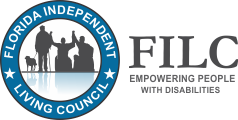Independent Living Philosophy & History
The concepts that unite the independent living movement are expressed through a philosophy that has profound implications for individuals with disabilities, family members and our entire culture. Independent living philosophy is not just about an individual living in an apartment rather than in an institution; nor is it solely about finding a job, having a social life, being able to ride an accessible bus, etc. It is about changing the way “we the people” structure our society. Independent living philosophy challenges us all to actualize the liberating ideals of our most precious documents: The Declaration of Independence and the Constitution of the United States.
Independent living philosophy in action means that when an architect designs a building, it should be conceptualized so as to be easily accessible to all, not simply to those who are able to climb stairs or open doors without alternative methods of entry. As a culture, we should expect that buildings that serve the public must accommodate all of the public. This has radical implications for how we shape our physical environment.
Independent living philosophy in action means that when children go to school, teachers must accommodate the individual needs of each student, not simply the needs of the status quo. This has radical implications for when we shape the minds that make up our social environment.
Independent living philosophy in action means that every individual has responsibilities that accompany each right, but that these responsibilities do not include having to overcome socially imposed physical and attitudinal barriers that have nothing to do with an individual’s abilities. Rather they have everything to do with the conscience and unconscious choices we collectively make as a society that limits the participation of people with disabilities in the community at large.
In summary: Independent living philosophy promotes consumer control of services, self-determination and equal access and participation in every aspect of community life, to the level that an individual wishes. Independent living does not necessarily mean living on one’s own, but it does mean having a level playing field so that one has the opportunity and the right to do so, if one chooses.
Independent Living Philosophy and Traditional Rehabilitation: A comparison of Process Assumption and Options:
Historically, “Independent Living” has related to the functional abilities of people with severe disabilities to perform the common “activities of daily living” with varying levels of support. This medically-based definition focuses primarily on the physical functioning, motivation and skill deficits of the individual with the disability, rather than on the physical attitudinal barriers that exist in the general community.
Independent living philosophy encourages people with disabilities to actively participate in their own rehabilitation process as a self-directing, self-empowered individual, rather than as a passive receiver of services or a patient.
The patient is a consumer of services, a peer and a self-advocate, not just a person who is “under the care” of a professional diagnostician, a prescriber of services, a “gateway” to further needed treatments.
As general statements, these descriptions cannot fully describe the strengths and limits of either the independent living paradigm or the medical model paradigm; however, they are offered as a means of illustrating that how we think about an issue, effects the outcome. Independent living philosophy is therefore focused on developing self-advocates who feel empowered to self-direct their own services and to affect change in the community through advocacy, education and peer support among people with disabilities.
